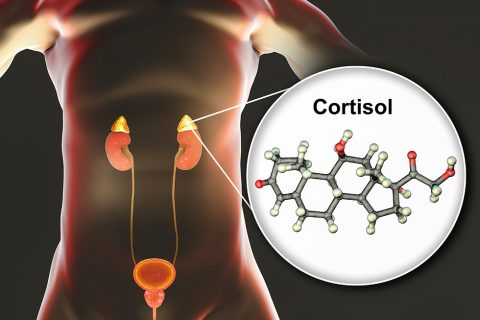What is it? Think of cortisol as nature’s built-in alarm system.
It’s your body’s main stress hormone. It works with certain parts of your brain to control your mood, motivation, and fear.
Your adrenal glands — organs at the top of your kidneys — make cortisol.
Cortisol plays an important role in a number of things your body does. For example, it:
- Manages how your body uses carbohydrates, fats, and proteins
- Keeps inflammation down
- Regulates your blood pressure
- Increases your blood sugar (glucose)
- Controls your sleep/wake cycle
- Boosts energy so you can handle stress and restores balance afterward
Understanding Cortisol:
The best way to think about hormones is as cellular messengers. They deliver information about what’s happening outside the body to cells inside the body. Cortisol is the emergency hormone. It sends a message similar to first responders like firefighters and police officers. Cortisol plays both a protective role and adaptation role. It works against inflammation and also releases the body’s sugar and fat stores to meet the demands of stress. Anything that poses a potential threat to the body will result in cortisol being called in to help which means cortisol levels are raised.
Cortisol is also involved in cravings. Cortisol along with other stress hormones (i.e. the catecholamines), increases desire for more palatable, calorie dense foods. It does this while simultaneously shutting off the goal oriented centers of the brain and ramping up the reward centers of the brain. This is a bad combo if you want to stick to your diet. In other words, there’s a reason we want a triple decker boo-boo burger when we’re stressed rather than the chicken and broccoli already prepared in the refrigerator. Cortisol may be part of that reason.
Cortisol Management:
There’s a lot more to the story of cortisol, but let’s examine some things you can do to manage cortisol. The three best ways to control cortisol are diet, exercise, and lifestyle. And the three easiest ways to assess if cortisol is balanced is by paying attention to hunger, energy, and cravings (HEC or “heck”). If your HEC is in check, it’s a rough indication that cortisol is as well.
Is Cortisol bad?
Cortisol is a steroid hormone, in the glucocorticoid class of hormones. When used as a medication, it is known as hydrocortisone.
It is produced in many animals, mainly by the zona fasciculata of the adrenal cortex in the adrenal gland. It is released with a diurnal cycle and its release is increased in response to stress and low blood-glucose concentration. It functions to increase blood sugar through gluconeogenesis, to suppress the immune system, and to aid in the metabolism of fat, protein, and carbohydrates. It also decreases bone formation. Cortisol is nothing bad as long as it stays in balance! Any hormone that is out of balance can lead to problems.
Cortisol is a very important and helpful agent as long as levels are stable.





